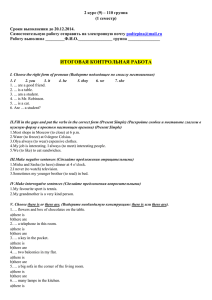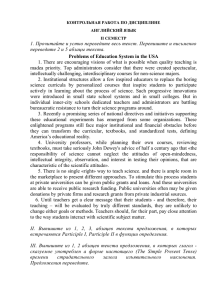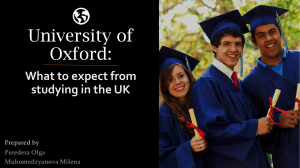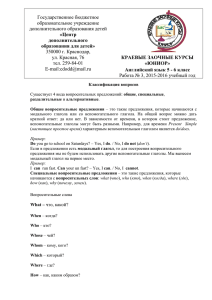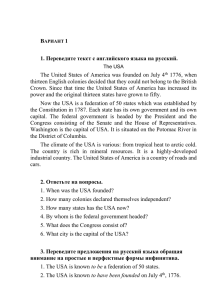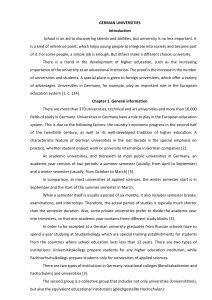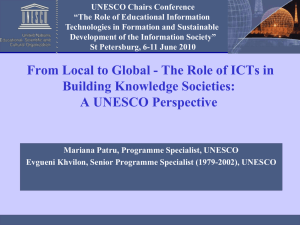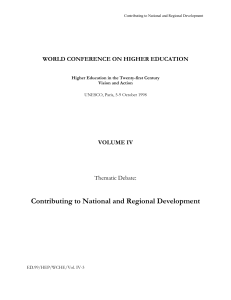файл(69.2 КБ)
advertisement
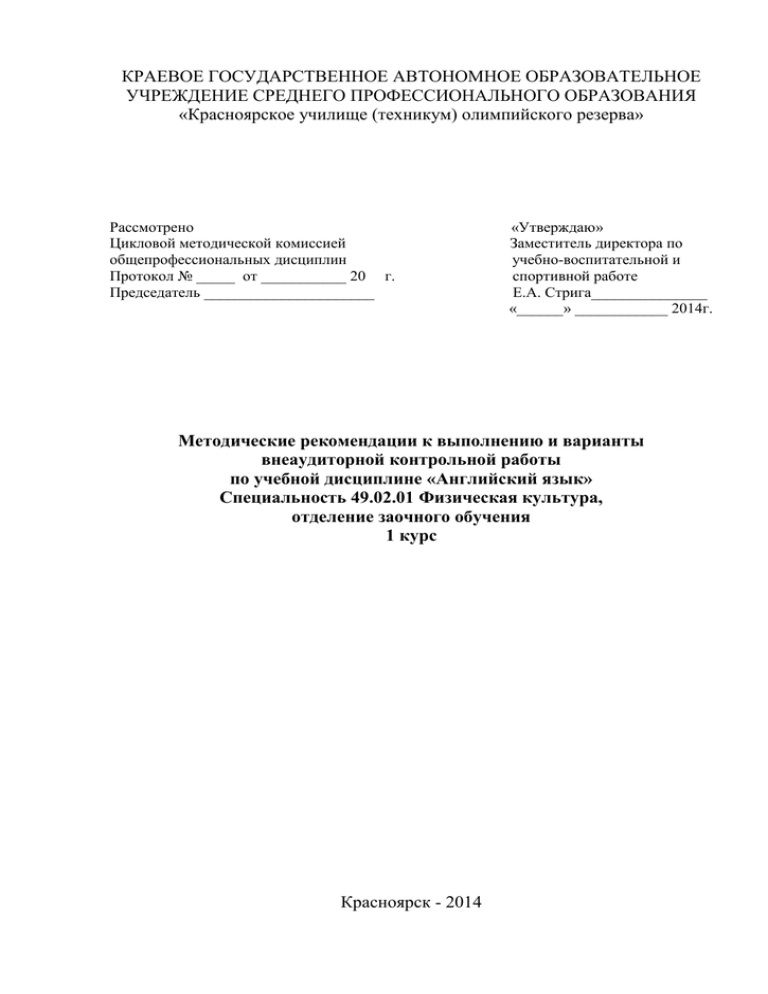
КРАЕВОЕ ГОСУДАРСТВЕННОЕ АВТОНОМНОЕ ОБРАЗОВАТЕЛЬНОЕ УЧРЕЖДЕНИЕ СРЕДНЕГО ПРОФЕССИОНАЛЬНОГО ОБРАЗОВАНИЯ «Красноярское училище (техникум) олимпийского резерва» Рассмотрено Цикловой методической комиссией общепрофессиональных дисциплин Протокол № _____ от ___________ 20 г. Председатель ______________________ «Утверждаю» Заместитель директора по учебно-воспитательной и спортивной работе Е.А. Стрига_______________ «______» ____________ 2014г. Методические рекомендации к выполнению и варианты внеаудиторной контрольной работы по учебной дисциплине «Английский язык» Специальность 49.02.01 Физическая культура, отделение заочного обучения 1 курс Красноярск - 2014 Темы домашних контрольных работ по учебной дисциплине «Английский язык» для студентов 3 курса заочного отделения КОНТРОЛЬНАЯ РАБОТА N1 Вариант 1 (А,Ж.Н,У,Щ) Для того чтобы выполнить контрольную работу, необходимо усвоить следующий грамматический материал: 1. Существительное. Число, падеж. 2. Местоимение. Личные и притяжательные местоимения. 3. Прилагательное. Степени сравнения. 4. Числительное. Порядковые и количественные числительные. 5. Глагол. Правильные и неправильные глаголы. Видо - временные формы английского глагола (действительный залог). 6. Словообразование. Основные словообразовательные суффиксы. 7. Структура предложения. Повествовательные, вопросительные, отрицательные предложения. Оборот there is/are. / . Прочтите текст и письменно ответьте на вопросы, следующие за ним. Higher Education in the USA 1. Higher education in America is provided by colleges and universities. The main difference between a college and a university is that the latter is a collection of colleges each of which specializes in a different field. 2. American colleges and universities are either private or public. There are nearly 1900 institutes of higher learning in America. Roughly one-third are state institutions, 1,200 are private ones. Only about half of the school children graduate from high school in America and receive a high school diploma. College is getting more expensive every year. Not all American families can afford universities education. 3. The American high school offers a wide variety of courses. In the same school a student can specialize in economics, in chemistry and physics, Latin and humanities, or in automobile mechanics. During the four-year high school program, the student studies four or five major subjects per year. In addition the students usually have classes in physical education, music and art. The first two years are a continuation of secondary education; then a student begins an intensive study of his special field. If a student fails a course, he repeats only that course and not the work of the entire year. 4. Students are classified as freshmen, sophomores, juniors and seniors. A freshman is a first year student; a sophomore, a second year student; a junior, a third year student; and a senior, a fourth year student All students who have graduated from the senior class and who continue studies at a university are classified as advanced students or graduate students. 5. At the conclusion of studies a college or university grants a bachelor's degree; after one or two additional years of studies — a master's degree. The highest academic degree is the Doctor of Philosophy (PhD). It may take a number of years to complete the original research work necessary to obtain this degree. 6. College prepares the student for two things: either graduate studies, leading to a master's or doctor's degree, or a job immediately after graduation. The majority of college graduates have to apply to public and private employment agencies to get any job, which is not an easy thing. 7. Each college has a special subject area. There may be a college of liberal arts where humanities, social sciences, natural sciences and mathematics are taught. There may be a college of education and a college of business. Notes: ' is provided by — здесь осуществляется 2 Students are classified as ... — Студентов подразделяют на ... 3 either... or — либо ... либо 1.How many institutes of higher learning are there in America? 2.Are there private and state colleges in the USA? 3.Is education getting more expensive every year ? 4.When does a student begin an intensive study of his special field?? 5.The highest academic degree is PhD, isn't it? П. Письменно переведите 2, 5, 6-й абзацы текста. III. Составьте предложения из данных слов. 1.a wide variety/ the American / high / of courses/ school/ offers. 2.is getting / expensive / more / college / year / every. 3.a continuation / die first / of secondary / two years/ are / education 4.the Doctor / the highest / of Philosophy / degree / academic / is. 5.private / or public / either / are / American colleges / universities / and. IV. Подберите соответствующее слово и напишите словосочетания. specializes graduate afford receive advanced difference a freshman a senior a junior conclusion grants complete 1 .. a bachelor's degree 2.. a high school diploma 7 …. the research 8 ….students 3,. is a first-year student 4,. from high school university 5…is a third-year student 6…at …the…of studies 9 ….. universities education 10….between a college and a 11… a fourth-year student 12… in economics V. По суффиксу определите и отберите: 1) существительные; 2) прилагательные; 3) глаголы; 4) наречия: education, difference, collection, specialize, different, American, nearly, roughly, institution, expensive, addition, physical, intensive, special, conclusion, additional, academic, immediately, easy, employment, critisize. VI. Определите степени сравнения прилагательных: the highest degree, the oldest university, the most interesting innovation, the poorer boys, a more difficult subject, a more philosophical college, the largest university. VII.Выпишите из 4-го абзаца порядковые числительные. VIII. Выпишите падеже. из 5-го абзаца существительные в притяжательном IX.Употребите местоимения в нужной форме. 1. Students' councils are responsible for various activities. ... help to settle students' problems. ... main role is to represent the interests of the students. 2. The Open University was founded in 1964. ... takes both men and women at the age of 21 and over. ... is a non-residential university. ... first course began in 1971. 3. Michael N. is a student. ... studies at the University. As a rule ... gets up at 7 o'clock.... lessons start at 8.30. It takes ... 30 minutes to get to the University. X. а) Поставьте глагол to be в нужной форме. 1.The university ... a collection of colleges. 2.The first two years at the University ... a continuation of secondary education. 3.A freshman... a first-year student. 4.There ... no other universities in England, apart from Oxford and Cambridge, until the 19th century. 5.Universities ... centres of research. 6.Bacon, Cromwell, Newton... Oxbridge students. б) Поставьте предложения в вопросительную и отрицательную форму. XI.Составьте предложения по модели, употребив оборот there is/are. M o d e l : a tendency; to expand old universities; in Britain There is a tendency to expand old universities in Britain. 1)nearly 1900 institutes of higher learning; in America. 2)more than 40 universities; in Britain. 3)numerous societies; in British universities. 4)more than 150,000 students; at the Open University. XII. Определите функции глагола to have в 3, 4, 6-м абзацах. XIII. а) Определите видо-временную форму глаголов в следующих предложениях; предложения переведите: 1.Each university decides each year how many students it supposes to admit. 2.College graduates have applied to a public employment agency to get a job. 3.Many great men studied at Oxbridge. 4. In teaching the Open University uses a combination of television and radiobroadcasts. They also produced a whole library of short course-books. 5. At any time a student needs advice, members of the Union Council will be glad to be of assistance. 6. College education is getting more expensive every year. 6) Поставьте предложения в вопросительную и отрицательную форму. КОНТРОЛЬНАЯ РАБОТА N1 ВАРИАНТ 2 (Б,З,О,Ф,Э) Для того чтобы выполнить контрольную работу, необходимо усвоить следующий грамматический материал: 1.Существительное. Число, падеж. 2.Местоимение. Личные и притяжательные местоимения. 3.Прилагательное. Степени сравнения. 4.Числительное. Порядковые и количественные числительные. 5.Глагол. Правильные и неправильные глаголы. Видо - временные формы английского глагола (действительный залог). 6.Словообразование. Основные словообразовательные суффиксы. 7. Структура предложения. Повествовательные, вопросительные, отрицательные предложения. Оборот there is/are. / . Прочтите текст и письменно ответьте на вопросы, следующие за ним. Education in the Russian Federation. 1. Russians have always shown a great concern for education. The right to education is stated in the Constitution of the Russian Federation. It is ensured by compulsory secondary schools, vocational schools and higher education establishments. It is also ensured by the development of extramural and evening courses and the system of state scholarships and grants. 2. Education in Russia is compulsory up to the 9th form inclusive. The stages of compulsory schooling in Russia are: the first stage is primary education for ages 6-7 to 910 inclusive; the second stage is secondary education including intermediate school for ages 10-11 to 12-13 inclusive; the third stage is senior schools for ages 13-14 to 14-15 inclusive. If a pupil of a secondary school wishes to go on in higher education, he or she must stay at school for two more years. Primary and secondary school together comprise 11 years of study. Every school has a curriculum of academic subjects, such as Russian, Literature, Mathematics, History, a foreign language and others. Lyceums and gymnasiums offer programs giving a profound knowledge in some field of study. 3. After finishing the 9th form one can go on to a vocational school which offers programmes of academic subjects and a programme of training in a technical field, or a profession. After finishing the 11th form of a secondary school, a Iyceum or a gymnasium one can go on in higher education. All applicants must take competitive examinations. 4. Higher education institutions, that is, institutes or universities, offer a 5-year programme of academic subjects for undergraduates in a variety of fields, as well as a graduate course. All students who have finished a graduate course and who have writtten a thesis receive a candidate's degree or a doctor's degree. 5. Higher educational establishmens are headed by Rectors. Prorectors are in charge of academic and scientific work. An institute ot university has a number of faculties, each specializing in a field of study. Faculties have specialized councils which confer a candidate's or a doctor'degrees. 6. The system of secondary and higher education in Russia is going through a transitional period. The main objectives of the reform are: to decentralize the higher education system, to develop a new financial mechanism, to give more academic freedom to faculties and students. 7. All secondary schools, institutes and universities until recently have been funded by the state. Now there are some private primary and secondary schools where pupils have to pay for their studies. Students of institutes and universities get scholarships. At many institutes and universities there are also departments where students have to pay for their education. 1. What is the right to education in Russia ensured by? 2. What are the stages of compulsory schooling in Russia? 3. What is a vocational school? 4. What degree can one get at a higher education establishment? 5. What is the structure of an institute or a university? /. Составьте предложения из данных слов. 1. secondary / for / everyone / education / is / available. 2. those / who / scholarships / receive / study / well. 3. examinations /entrance / a higher / depend / school / on. 4. lectures / attend / the students / classes / practical / and. 5. have / all / students / training / practical / enterprises / at. IV. По суффиксу определите и отберите: 1)существительные; 2) прилагательные; 3) глаголы; 4) наречия: education, vocational, academic, technical, establishment, scientific, specialize, mechanism, freedom, recently, department, decentralize, comprise, privately, compete, financially, develop, traasitional, gymnasium, applicant. V. Определите степени сравнения прилагательных. VI.Выпишите из 2-го абзаца порядковые числительные. VII. Выпишите из 4-го абзаца существительные в притяжательном падеже. VIII. Употребите местоимения в нужной форме. 1.An institute has a number of faculties. ... specialize in different fields of study. 2.The scientist published ... articles in the journal. ... wrote about the education ... Were discussed at the conference. 3.New York is one of the largest cities in the world. ... was founded by the Dutch. ... central part is on Manhattan Island. IX. а) Поставьте глагол to be в нужной форме. 1. The main objective of the reform ... to develop a new financial mechanism. 2. Academic subjects ... Russian, Literature and Mathematics. 3. Some institutions ... universities with graduate and professional schools. 4. Competitive examinations ... necessary for all More difficult, the most developed, the highest level, longer period of time, better knowledge, more common programs. 5.All secondary schools ... funded by the state. 6.There ... some stages of compulsory education in Russia. б) Поставьте предложения в вопросительную и отрицательную форму. X. Составьте предложения по модели, употребив оборот there is/are. M o d e l : tendency; to expand old universities; in Britain. There is a tendency to expand old universities in Britain. 1.Vocational and technical schools; in the city. 2.Departments, at many universities, having graduate courses. 3.Not only, universities, in Russia, but also colleges. 4.A good library, at the University. X. Определите функции глагола to have в 4, 5, 7-м абзацах. XI. а) Определите видо-временную форму глаголов в следующих предложениях; предложения переведите. 1. A college gives general knowledge in academic subjects. 2. Specialized councils confer candidate and doctoral degrees. 3. The system of education in Russia is going through a transitional period. 4. The state has funded all secondary schools, institutes and universities. 5. Russians have always shown a great concern for education. 6. Sport became an essential part of students' life and they did any sport the liked. б ) поставьте предложения в вопросительную и отрицательную форму. КОНТРОЛЬНАЯ РАБОТА N 1 ВАРИАНТ 3 (В,И,П,Х,Ю) Для того чтобы правильно выполнить контрольную работу, необходимо усвоить следующий грамматический материал: 1.Словообразование: основные словообразовательные суффиксы. 2.Видо - веменные формы глагола (действительный залог) 3.Согласование времен. 4.Неопределенные местоимения some, any, по и их производные. 5.Употребление местоимений it и one. 6.Усилительная конструкция it is ... that. Модальные глаголы и их эквиваленты I. Прочтите текст и письменно ответьте на вопросы, следующие за ним. British Universities 1. There are more than forty universities in Britain. The two oldest universities in England are Oxford and Cambridge. These date from the Middle Ages. Oxford is the oldest of these two universities, it is more philosophical, classical, theological. The history of Oxford began in 1249, that of Cambridge - in 1348. Among the English universities Oxford and Cambridge have special eminence, and they are different from the others. 2. England had no other universities, apart from Oxford and Cambridge, until the nineteenth century. The universities which were founded between 1850 and 1950, including London University, are known as redbrick universities. They were called so because that was the favourable building material of the time. 3. The division between Oxford and Redbrick is sharp. The division is essentially a class one. Redbrick universities were built to provide a liberal education for the poorer boys and to give technological training. Oxford and Cambridge graduates scorned them. 4. The universities which were founded after the Second World War are called "the new universities". Some of them quickly became popular because of their modern approach to university courses. 5. All British Universities are private institutions. Every university is independent, autonomous and responsible only to its own governing council. Although they all receive financial support from the state, the Department of Education and Science has no control over their regulations, curriculum, examinations, appointment of staff or the way they spend money. The number and type of faculties differ from university to university. 6. Each university decides each year how many students it supposes to admit. The admission to universities is by examinations or selection (interviews). The student receive grants. They have to pay fees and living costs but every student may receive from the local authority of the place where he lives a personal grant which is enough to pay lodging and food - unless his parents are rich. 7. Students who pass examinations at the end of three or four years of study get Bachelor's degree. The first postgraduate degree is normally that of Master conferred for a thesis based on at least one's fulltime work. Universities are centres of research and many postgraduates are engaged in research for higher degree, usually Doctorates. 1. How many universities are there in Great Britain? 2. What are the oldest British universities? 3. Why did "the new universities" quickly become popular? 4. What univesity degree do you know? I I Письменно переведите 2, 5, 6, 7-й абзацы текста. III. а) Образуйте существительные при помощи данных суффиксов переведите их: er: research, teach, lecture Hon: to examine, to administrate, to regulate sion: to conclude, divide, decide ence: to differ, eminent, to defend их: б) Образуйте прилагательные при помощи данных суффиксов переведите cial: office, society, finance ive: administration, progress, decision al: theology, philosophy, politics able: to change, to rely, to understand IV. Подберите английским словосочетаниям русские эквиваленты. 1.higher education а. получать стипендию 2.private institutions b. местные власти 3.university curriculum с. учебный триместр 4.to receive grants d. сдать экзамены 5.local authority е. учебный план университета 6.academic session f. высшее образование 7.to pass exams g. научно- исследовательский центр 8.research centre h. частные учебные заведения V. Выберите правильное слово: 1.Oxford is ... of all British universities. a) the youngest b) the oldest c) the poorest 2.All British universities are ... institutions, a) state b) old c) private 3.The ... to the Universities is by examination or selection, a) admission b) regulation c) innovation 4.Every student may receive from the ... a personal grant. a) government b) local authority c) Department of Education and Science 5.The students ... grants. a) spend b) receive c) pay VI. Определите видо-временные формы глаголов в следующих предложениях: 1.The University arranges lectures for all the students of the colleges. 2.The history of Oxford began in 1249. 3.Some of the universities have become popular because of their modern approach. 4.Most students take jobs in the summer for about six weeks. VII.Поставьте сказуемые придаточного предложения в нужной форме, учитывая правила согласования времен. 1. The students said that they (take) examinations in summer. 2. They said that the students already (receive) personal grants from the local authority. 3. Universities decided that they (engage) postgraduates in research the next academic session. VIII.Выберите нужное местоимение из данных в скобках. 1. England had (any, no) other universities apart from Oxford and Cambridge until the 19th century. 2. They all receive (something, some) financial support from the state. 3. The Department of Education has (no, nothing) control over the curriculum of the universities. 4. (Some, somebody) students at the end of study get Bachelor's degree. 5. Many postgraduates are engaged in (anything, some) research for higher degree. IX. Переведите предложения, обращая внимание на различные значения слов it, one. 1.It is one of the oldesr universities. 2.It is important and necessary to pay fees and living costs. 3.One cannot imagine Oxford students without long black gowns at the lectures. 4.The division between Oxford University and new ones is sharp. X. Переведите предложения, содержащие модальные глаголы эквиваленты. 1. The students have to pay fees and living costs. 2. The student may receive a personal grant from the local authority. 3. No student is allowed to attend a lecture without a long black gown. 4. For a break of discipline a student can be fined a sum of money. и их КОНТРОЛЬНАЯ РАБОТА N 1 ВАРИАНТ 4 (Г,К,Р,Ц,Я) Для того чтобы правильно выполнить контрольную работу, необходимо усвоить следующий грамматический материал: 1.Словообразование: основные словообразовательные суффиксы. 2.Видо-временные формы глагола (действительный залог) 3.Согласование времен. 4.Неопределенные местоимения some, any, по и их производные. 5.Употребление местоимений // и one. 6.Усилительная конструкция it is ... that. 7.Модальные глаголы и их эквиваленты. I. Прочтите текст и письменно ответьте на вопросы, следующие за ним. Oxbridge and the Open University 1.Two universities, Oxford and Cambridge, as they are sometimes jointly called, for seven hundred years dominated British education, and today they dominate more than ever. The students od Oxbridge make up one of the most elite elites in the world. Many great men studied here. Among them Milton, the poet, Cromwell, the soldier and Newton, the scientist. Many prominent Conservative and Labour leaders and ministers, members of the Royal family studied there too. 2.Today Oxford and Cambridge have less than one-tenth of all British university students (less than 1% of Britain's population). Only a small per cent of the candidates are chosen - mainly on the results of the written examinations. 3.The division between Oxford and other universities is sharp. The division is essentially a class one. A large per cent of Oxford undergraduates come from public schools. Only since the 1870s women have been admitted and the women's colleges coastitute only 12% of the Oxbridge population. 4.Oxford and Cambridge preserve an antique way of life in the midst of the twentieth century. Both Oxford and Cambridge now consist of self-governing colleges where students live. The students have lectures and tutorials. Each student has a tutor who tells him to write papers on the subjects he is studying. Tutors are responsible for the students' progress. 5.The Open University was founded in 1964 by the Labour Government for those people who, for some reason, had nor had a chance to enter any of the other universities, especially those above normal student age. It takes both men and women at the age of 21 and over. No formal academic qualifications are necessary for entry to these courses, but the standards of its degrees are the same as those of other universities. 6. It is a non-residential university. In teaching the university uses a combination of television and radio broadcasts, correspondence courses and summer schools, together with network of viewing and listening centres. Lecturers present their courses on one of the BBC's television channels and by radio. They have also produced a whole library of short course-books, which anyone can buy at bookshops. 7. Students write papers based on the courses and discuss them with tutors at meetings or by correspondence once a month. Degrees are awarded on the basis of credit gained by success at each stage of the course. Six credits are necessary for a BA degree and eight credits for a BA Honours degree. The time of staying on at the Open University is unlimited. Notes: non-residential - без постоянного помещения viewing and listening centres - видео- и аудиоцентры credit - "успешно" (оценка за сданные экзамены) BA degree - Bachelor of Arts degree 1. What universities dominate British education? 2. What great men studied at Oxbridge? 3. Who is responsible for the students' progress? 4. What does the Open University use in teaching? 5. How are degrees awarded? II. Письменно переведите 1, 4, б, 7-й абзацы текста. III. а) Образуйте существительные при помощи данных суффиксов и переведите их. er: philosophy, ministry, lecture to: science, programme, philology ssion: admit, express, commit ship: member, friend, leader б) Образуйте прилагательные при помощи данных суффиксов и переведите их. ive: express, decision, execute ent: prominence, correspondence, presence ic: class, academy, history tial: essence, residence, president IV. Подберите английским словосочетаниям русские эквиваленты. 1.prominent leaders а. частная школа 2.to be admitted to the university b. заочные курсы 3.to be responsible for students' progress с. выдающиеся руководители 4.a non-residential university d. число студентов 5.correspondence courses 6.viewing and listening centres 7.the number of undergraduates 8.a private school e. быть принятым в университет f. быть ответственным за достижения студентов g. видио и аудиоцентры h. университет без постоянного помещения V. Выбирите правильное слово и напишите предложение 1.large per cent of Oxford undergraduates come from .... a) private schools b) primary schools c) public schools 2.Oxford and Cambridge preserve an ... way of life, a) modern b) ancient c) antique 3.... are responsible for students' progress, a) lecturers b) tutors c) deans 4.The Open University is a ... university. a) residential b) non-residential c) stationary 5.Degrees are awarded on the basis of... . a) examinations b) credit c) tests VI.Определите видо-временные формы глаголов в предложениях. 1.Many great people studied at Oxford University. 2.A large per cent of Oxford undergraduates come from public schools. 3.A tutor tells the students to write papers on subjects. 4. Some people had not had any chance to enter any of the other universities before. VII. Поставьте сказуемые придаточного предложения в нужной форме, учитывая правила согласования времен. 1. The tutor said that the students (discuss) their papers at meetings 2. The lecturer reported that high schools (offer) a wide variety of courses. 3. They said that the number of undergraduates (reach) 65,000 by 1971. V I I I . Выберите нужное местоимение из данных в скобках: 1.(No, nothing) formal academic qualifications are necessary for entry to these courses. 2.(Some, any) prominent leaders studied there too. 3.The students discuss (something, some) at the meetings. 4.They have a whole library of course-books, which (anyone, any) can buy at bookshops. 5.(Nobody, No) is responsible for the students' progress. IX Переведите предложения, обращая внимание на различные значения слов it, one. 5.It is one of the oldesr universities. 6.It is important and necessary to pay fees and living costs. 7.One cannot imagine Oxford students without long black gowns at the lectures. 8.The division between Oxford University and new ones is sharp. X. Переведите предложения, содержащие модальные глаголы эквиваленты. 5. The students have to pay fees and living costs. 6. The student may receive a personal grant from the local authority. 7. No student is allowed to attend a lecture without a long black gown. 8. For a break of discipline a student can be fined a sum of money. и их КОНТРОЛЬНАЯ РАБОТА N 1 ВАРИАНТ 5 (Д,Л,С,Ч) Для того чтобы выполнить контрольную работу, необходимо усвоить следующий грамматический материал: 7.Существительное. Число, падеж. 8.Местоимение. Личные и притяжательные местоимения. 9.Прилагательное. Степени сравнения. 10.Числительное. Порядковые и количественные числительные. 11.Глагол. Правильные и неправильные глаголы. Видо - временные формы английского глагола (действительный залог). 12.Словообразование. Основные словообразовательные суффиксы. 7. Структура предложения. Повествовательные, вопросительные, отрицательные предложения. Оборот there is/are. / . Прочтите текст и письменно ответьте на вопросы, следующие за ним. Oscar Wilde 1.Oscar Wilde was born in Dublin in 1854. He was the son of a brilliant surgeon and a poetess. The Wildes had three children, two sons and a daughter. Oscar was rge second son and his full name is Oscar Fingal O'Flahertie Wills Wilde. Oscar and his brother Willie had the best schooling of the time. They were sent to the Portora School at Enniskillen, one of the four Royal schools of Ireland. Oscar went to Portora at the age of nine and left when he was just seventeen. 2. Even as a schoolboy he was an excellent talker. His descriptions of school were humorous and always highly amusing. Oscar was a great reader and read very fast. The classics absorbed almost his whole attention in his later school days. Oscar Wilde was educated in Trinity College in Dublin, then at Magdalen College in Oxford, where he won the prise for poetry. He left Oxford as a Professor of Aesthetics and a Critic of Art. After he was graduated, he settled in London and soon became the leader of an aesthetic movement and was famous for the brilliance of his wit and conversation. 3. Wilde's first literary success came in 1888 with the publication of a book of fairy stories. The Happy Prince and Other Tales. His novel The Picture of Dorian Gray created a sensation largely by its theme of moral decay. In the next four years he produced four plays, which, by their sparkling dialogues and clever characterization, immediately revealed Wilde as the dramatist of his day. Lady Windermere's Fan was produced in 1892. A Woman of No Importance in 1893, An Ideal Husband in 1894, and The Importance of Being Earnest in 1895. His specific humour makes everyone laugh and feel the beauty of life while reading such plays as Lady Windermere" Fan and Ibe Importance of Being Earnest. 4. At the height of his career Oscar Wilde left England and went to Paris where he died in 1900 and was buried there in the cemetery of Pere-Lachaise. 5. Oscar Wilde was the true artist and all his works speak for themselves and we always want to reread them. Here are his very words from his article The Decay of Lying: "We have rarely any artist pleasure in re-reading a modern novel. And this is perhaps the best rough test of what is literature and what is not. If one cannot enjoy reading a book over and over again, there is no use reading it at all" Notes: the best schooling of the time - наилучшее образование для своего времени I. 1. 2. 3. 4. 5. Письменно ответьте на вопросы по тексту. When and where was Oscar Wilde born? Where did he get his education? When did he publish his first successful book? What other his works do you know? Where did Oscar Wild die? П. Письменно переведите 1, 3, 5-й абзацы текста. III. Составьте предложения из данных слов. 1. the\ son of\ He\ surgeon\ was\ poetess\ and\a 2. the time\ Oscar\ had\ and\ his brother\ the best\ Willie\ had\ of\ schooling 3. Oscar \reader\ read\ fast\ was\ and\ great\ a\ very 4. He \ a \Professor \Aesthetics \ a \ Critic \ of \Art\ left\ Oxford\ of\ as \ and 5. as \schoolboy\ was\ an\ talker\ Even\ he\ excellent\ a IV. Составте словосочитания из слов. Full won fairy creat brilliant moral absorb a sensation name decay the attention the prise stories surgeon V. По суффиксу определите прилагательные; 3) наречия: и отберите: 1) существительные; 2) Talker, description, humorous, highly, attention, movement, famous, publication, immediately, rarely, pleasure, dramatist VI.Напишите степени сравнения от прилагательных: Excellent, humorous, great, famous, good, sparkling, true, modern VII Выпишите из 1-го и пятого абзаца в 2 столбика порядковые и количественные числительные. VIII. Выпишите падеже. из 5-го абзаца существительное в притяжательном IX. Поставьте глагол to be в нужной форме. 1. He_____ the son of a brilliant surgeon and a poetes. 2. They ________sent to the Portora School at Enniskillen, one of the four Royal schools of Ireland. 3. Even as a schoolboy he ________ an excellent talker. 4. His descriptions of school ________ humorous. 5. And this _______ perhaps the best rough test of what ______ literature and what ____ not. X Поставьте предложения в вопросительную и отрицательную форму. 1. 2. 3. 4. 5. At the height of his career Oscar Wilde left England. Wilde's first literary success came in 1888. In the next four years he produced four plays. Oscar Wilde was the true artist. Oscar went to Portora at the age of nine and left when he was just seventeen XI. а) Определите видо-временную форму предложениях; предложения переведите. глаголов 1. Oscar was a great reader and read very fast. 2. . The Wildes had three children, two sons and a daughter. 3. He left Oxford as a Professor of Aesthetics and a Critic of Art. в следующих 4. Here are his very words from his article The Decay of Lying: "We have rarely any artist pleasure in re-reading a modern novel. 5. If one cannot enjoy reading a book over and over again, there is no use reading it at all" XII Напишите 4 предложения на английском языке, что еще вы знаете об Оскаре Уаилде? КОНТРОЛЬНАЯ РАБОТА N 1 ВАРИАНТ 6 (Е,Ё,М,Т,Ш) Для того чтобы выполнить контрольную работу, необходимо усвоить следующий грамматический материал: 13.Существительное. Число, падеж. 14.Местоимение. Личные и притяжательные местоимения. 15.Прилагательное. Степени сравнения. 16.Числительное. Порядковые и количественные числительные. 17.Глагол. Правильные и неправильные глаголы. Видо - временные формы английского глагола (действительный залог). 18.Словообразование. Основные словообразовательные суффиксы. 7. Структура предложения. Повествовательные, вопросительные, отрицательные предложения. Оборот there is/are. / . Прочтите текст и письменно ответьте на вопросы, следующие за ним. William Shakespeare 1. The poet's father, John Shakespeare, was a butcher. He dealt in meat, skins and leather, as well as in corn and wood. He turned his hand to anything - a jack of all trades. In 1557 he was elected town councillor, and shortly afterwards married Mary Arden whose father had been a substantial farmer. Mary Arden, though she could not sign her own name. 2. William Shakespeare, the first son and the third child of this couple, was born on the 22nd or 23rd April 1564 at Stratford- upon- Avon. 3. John Shakespeare's business seems to have run rapidly from bad to worse. Soon he had nothing to pay for the education of his sons. They had free tuition at the Grammar School at Stratford. William went to school when he was seven or eight years old and received an ordinary education together with some grounding in Latin 4. Of Shakespeare's life after he left school, say from thirteen to eighteen, we know almost nothing. He probably helped his father from time to time. At eighteen William married Anne Hathaway, a farmer's daughter of his neighbouring village of Shottery. She was nearly eight years older than he was. 5. In 1587 two companies of actors returned to London from a provincial tour, during which they visited Stratford. It is probable that Shakespeare returned with them to London. Shakespeare was received into an actor-company at first in a very mean rank, then he worked as an actor and adapted and wrote plays. 6. William Shakespeare had been to London about ten years , and no man has ever done so much in the time and been so successful. He had not only written the early poems and early plays, but half a dozen masterpieces: A Midsummer Night's Dream, Romeo and Juliet, Richard II, King John, The Merchant of Venice, the two parts of Henry IV. At thirty-three he was already the greatest poet and dramatist. 7. Shakespeare died in Stratford on his 52nd birthday. He was buried in the Stratford parish church. Thousands of people visit his birthplace and grave each year. Notes: together with some grounding in Latin - наряду с основами латыни in a very mean ran - в очень скромной должности 1. 2. 3. 4. 5. Who was the poet’s father? When did he marry? What was the motherland of the poet? What masterpieces of Shakespeare do you know& Where was the poet buried? П. Письменно переведите 1, 3, 5-й абзацы текста. III. Составьте предложения из данных слов. 1. business\ to \have\ rapidly \to \worse\ John Shakespeare's\ seems\ run\ from\ bad 2. Soon\ had\ for\ the\ of \his\ sons.\ to pay\ he\ nothing\ education 3. He\ his \time\ to\ time.\ probably\ father\ from\ helped 4. was\ eight \older \than \was.\ She\ nearly\ years\ he 5. It\ is\ returned\ them\ to\ London.\ probable\ Shakespeare\ with\ that IV. Составте словосочитания из слов. From bad A jack town left free receive early V. По суффиксу определите прилагательные; 3) наречия: tuition An education Of all trades councillor To worse school poems и отберите: 1) существительные; Butcher, business, rapidly ,education, probably, nearly, provincial, successful, early,probable VI.Напишите степени сравнения от прилагательных: Probable, great, successful, substantial, free, good, bad, little, beautiful, pour VII Выпишите из 2-го и третьего абзаца в 2 столбика порядковые и количественные числительные. 2) VIII. Выпишите из 1- 4-го абзацев существительные в притяжательном падеже. IX. Поставьте глагол to be в нужной форме. 1. The poet's father, John Shakespeare, was a butcher 2. William Shakespeare, the first son and the third child of this couple, was born on the 22nd or 23rd April 1564 at Stratford- upon- Avon. 3. She was nearly eight years older than he was. 4. It is probable that Shakespeare returned with them to London. 5. William Shakespeare had been to London about ten years , and no man has ever done so much in the time and been so successful. X Поставьте предложения в вопросительную и отрицательную форму. 1. 2. 3. 4. 5. He dealt in meat, skins and leather, as well as in corn and wood. He turned his hand to anything. Soon he had nothing to pay for the education of his sons. He probably helped his father from time to time. Shakespeare died in Stratford on his 52nd birthday XI. а) Определите видо-временную форму предложениях; предложения переведите. глаголов в следующих 1. William Shakespeare had been to London about ten years , and no man has ever done so much in the time and been so successful. 2. Thousands of people visit his birthplace and grave each year. 3. Of Shakespeare's life after he left school, say from thirteen to eighteen, we know almost nothing. 4. John Shakespeare's business seems to have run rapidly from bad to worse. 5. At eighteen William married Anne Hathaway, a farmer's daughter of his neighbouring village of Shottery XII Напишите 4 предложения на английском языке, что еще вы знаете о Шекспире?
